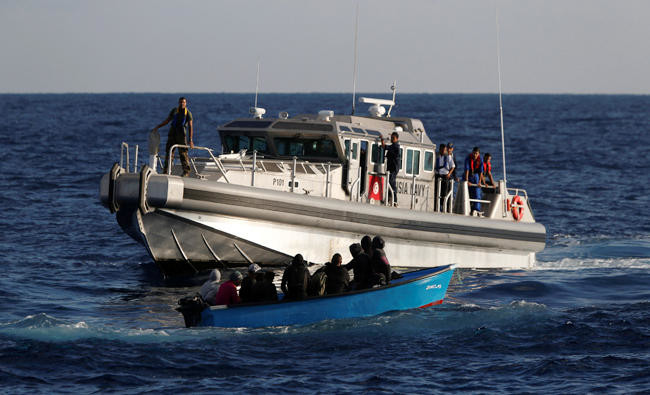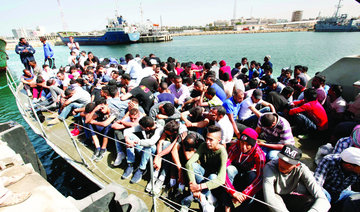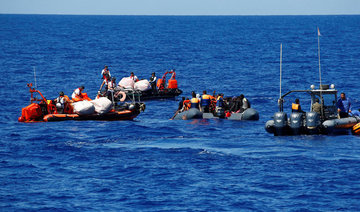TUNIS/THESSALONIKI: The Tunisian navy rescued 98 Tunisians fleeing to Europe when their boat started to sink off Kerkenah on the southeast coast late on Saturday, the national guard said.
Separately, the army said it had arrested 43 illegal migrants rescued from four boats off Zarzis, also on the southeast coast.
Tunisia has been praised for its democratic progress after a 2011 uprising against autocrat Zine El-Abidine Ben Ali but successive governments have failed to create jobs for young people, some of whom head illegally to Europe to seek work.
Tunisia arrested about 550 Tunisian and African migrants trying to sail to Europe in September, against only 170 in August, official data showed on Thursday.
Human traffickers increasingly use Tunisia as a launch pad for migrants heading for Europe as Libya's coast guard, aided by armed groups, has tightened controls.
"The water leaked to a boat carrying 98 migrants, when it was sinking, but the naval guard rescued them off the coast of Kerkenah," Col. Maj. Khelifa Chibani of Tunisia's national guard said.
Migrants’ smugglers held
Greek police said they have arrested eight migrant traffickers who reportedly smuggled 38 migrants through Greece's land border with Turkey.
All the arrests were made Friday, in northern Greece, in four separate incidents.
The largest group of migrants — 10 from Vietnam, two from Iraq and two from Pakistan — was smuggled by two Moldovans and a Romanian. The migrants were stashed in one car while two other traffickers drove another vehicle, checking for police roadblocks, police say.
Ten Syrians and Somalis smuggled in by a Bulgarian driver told police they paid €2,400 ($2,836) each to be taken into central Europe. Another seven Iraqis, five Afghanis and two Pakistanis were also smuggled in by traffickers.
Similar incidents occur almost daily, police say.
Tunisia rescues 140 migrants off its coast
Tunisia rescues 140 migrants off its coast

Israeli strikes on Iran have killed at least 950 people and wounded 3,450 others, a human rights group says

- US to strike Iran ”will be a legitimate target for our armed forces,” the state-run IRNA news agency reported
DUBAI, United Arab Emirates: Israeli strikes on Iran have killed at least 950 people and wounded 3,450 others, a human rights group said Monday.
The Washington-based group Human Rights Activists offered the figures, which covers the entirety of Iran. It said of those dead, it identified 380 civilians and 253 security force personnel being killed.
Human Rights Activists, which also provided detailed casualty figures during the 2022 protests over the death of Mahsa Amini, crosschecks local reports in the Islamic Republic against a network of sources it has developed in the country.
Iran has not been offering regular death tolls during the conflict and has minimized casualties in the past. On Saturday, Iran’s Health Ministry said some 400 Iranians had been killed and another 3,056 wounded in the Israeli strikes.
What do we know about US strikes on Iran’s nuclear facilities?

- Tehran says damage limited, no radiation leaks after Trump declares Iran’s uranium-enrichment capabilities destroyed
- Assault involved 14 bunker-buster bombs, more than two dozen Tomahawk missiles and over 125 military aircraft
DUBAI: Amid mounting speculation, the US launched air strikes on three of Iran’s nuclear facilities on Saturday.
The operation aimed to support Israel in its war against Iran — ongoing since June 13 — by crippling Tehran’s uranium enrichment capacity, according to Asharq News.
US President Donald Trump later announced that Iran’s uranium-enrichment abilities had been eliminated, warning Tehran against any “retaliatory response.” Tehran, however, described the damage as “limited” and dismissed any indications of radiation leaks.

The US strikes included 14 bunker-buster bombs, more than two dozen Tomahawk missiles and over 125 military aircraft, in an operation the top US general, General Dan Caine, said was named “Operation Midnight.”
Asharq News reported that the strikes targeted three critical nuclear facilities instrumental in Iran’s nuclear fuel cycle: Fordo, Natanz and Isfahan nuclear complex.
These sites span the entire fuel-enrichment chain — from raw uranium conversion, through enrichment, to the production of fuel and technical components for research reactors.
FASTFACTS:
• The first B-2 bomber was publicly displayed on Nov. 22, 1988, but its first flight was on July 17, 1989.
• The combat effectiveness of the B-2 was proved in the Balkans, where it was responsible for destroying 33 percent of all Serbian targets in the first eight weeks.
• In support of Operation Enduring Freedom, the B-2 flew one of its longest missions to date from Whiteman to Afghanistan and back.
• The B-2 completed its first-ever combat deployment in Iraq, flying 22 sorties and releasing more than 1.5 million pounds of munitions.

Fordo facility
Location and structure: Fordo is 30 kilometers northeast of Qom, embedded within a mountain at an altitude of approximately 1,750 m, with over 80 meters of rock and volcanic shielding — making it one of Iran’s most fortified sites.
Technical role: It houses two underground halls that can hold about 3,000 IR-1 centrifuges, enriching uranium up to 60 percent — a level nearing weapons -grade.
Strategic importance: It is a primary target in any military effort to prevent Iran from achieving nuclear military capability, due to its high capacity and protection.

Natanz reactor
Location and structure: Situated near Kashan in central Iran, partially buried under about 8 meters of earth with a 220meter-thick concrete roof, naturally shielded by surrounding mountainous terrain.
Technical role: Contains primary and experimental plants with over 14,000 centrifuges (IR-1, IR-2m, IR-4, IR-6), making it Iran’s main industrial enrichment hub.
Strategic importance: Responsible for producing most of Iran’s low-enriched uranium and plays a key role in centrifuge development.

Isfahan nuclear complex
Location and structure: Located south of Isfahan on an arid plateau away from populated areas, it is neither buried nor heavily fortified.
Technical role: Includes a Uranium Conversion Facility (UCF); a research reactor fuel production plant; and a metallic fuel pelletizing plant, and three research reactors.
Strategic importance: Serves as the backbone of Iran’s nuclear research and production infrastructure, supplying both Natanz and Fordo.
The Pentagon used some of the world’s most advanced aircraft for Saturday’s strikes. The B-2 Spirit is a multi-role bomber capable of delivering both conventional and nuclear munitions.
The bomber represents a major milestone in the US bomber modernization program. The B-2 brings massive firepower to bear anywhere on the globe through seemingly impenetrable defenses.

According to US officials, the bombers that carried out the Iran strikes flew for nearly 37 hours non-stop from its Missouri base, refueling in mid-air multiple times before striking in the early hours of Sunday.
A B-2 bomber offers several key advantages, primarily due to its stealth capabilities and global reach.
• A range over 11,000 km without refueling, capable of global reach from distant American bases.
• Stealth abilities such as flying-wing design and radar-absorbing materials that allow it to evade air defenses.
• It can carry both nuclear and conventional weapons, including the GBU‑57 bunker-buster bomb.
Initial reports quoted by Asharq News indicated that Fordo was hit with the GBU‑57, the most powerful US conventional bunker buster, designed for deeply buried targets like Fordo, which lies 90 meters underground. Fox News reported six bunker-busting bombs were dropped on Fordo, alongside approximately 30 Tomahawk cruise missiles fired at Natanz and Isfahan.

The GBU‑57 ‘Massive Ordnance Penetrator’ was designed by American military engineers to devastate deeply buried bunkers without radioactive fallout. It was the only nonnuclear weapon that could reach Iran’s hardest target.
• Weight: ~13,600 kg
• Length: 6.2 meters.
• Diameter: 0.8 meters.
• Explosive payload: 2,400 kg of high explosives.
• Guidance: GPS + inertial navigation.
* Penetration: Up to 60 meters of reinforced concrete or dense rock.
A Tomahawk cruise missile is a precision weapon that launches from ships, submarines and ground launchers and can strike targets precisely from a great distance, even in heavily defended airspace.

• Range: 1,250–2,500 km depending on variant.
• Speed: Subsonic (~880 km/h).
• Guidance: Inertial navigation, GPS, with some variants using terminal guidance (TERCOM, DSMAC).
• Warhead: ~450 kg conventional explosives.
• Launch platforms: Ships and submarines.
There has been a torrent of responses to the US move against Iran, Asharq News reported. President Trump declared the mission’s success, stating that the Fordo facility was “gone,” and Iran’s primary nuclear enrichment sites “completely and utterly destroyed.” Later on Sunday, US Defense Secretary Pete Hegseth said the strikes were an incredible and overwhelming success that have “obliterated Tehran’s nuclear ambitions.”
For its part, Iran’s Tasnim News Agency quoted an official saying the nuclear sites had been evacuated in advance, and the damage was “not irreparable.” The Atomic Energy Organization of Iran stated there was “no risk of any radiation leak.” Iran emphasized its nuclear industry would not be halted.

Israel rejects critical EU report ahead of ministers’ meeting

- European nations have been increasingly critical of the massive civilian toll of Prime Minister Benjamin Netanyahu’s military campaign against Palestinian militant group Hamas since its October 7, 2023 attack on Israeli communities
BRUSSELS: Israel has rejected a European Union report saying it may be breaching human rights obligations in Gaza and the West Bank as a “moral and methodological failure,” according to a document seen by Reuters on Sunday.
The note, sent to EU officials ahead of a foreign ministers’ meeting on Monday, said the report by the bloc’s diplomatic service failed to consider Israel’s challenges and was based on inaccurate information.
“The Foreign Ministry of the State of Israel rejects the document ... and finds it to be a complete moral and methodological failure,” the note said, adding that it should be dismissed entirely.
European nations have been increasingly critical of the massive civilian toll of Prime Minister Benjamin Netanyahu’s military campaign against Palestinian militant group Hamas since its October 7, 2023 attack on Israeli communities.
Palestinians waiting for humanitarian aid killed in airstrike

- The airstrike targeted the built-up Nuseirat refugee camp in central Gaza, according to Al-Awda Hospital, where the bodies were brought
- It said another 22 people were wounded while waiting for aid trucks
TEL AVIV: At least four Palestinians were killed on Sunday in an Israeli airstrike and 22 were wounded while waiting for humanitarian aid, according to a local hospital.
The airstrike targeted the built-up Nuseirat refugee camp in central Gaza, according to Al-Awda Hospital, where the bodies were brought.
It said another 22 people were wounded while waiting for aid trucks.
Palestinian witnesses and health officials say Israeli forces have repeatedly opened fire on crowds seeking desperately needed food, killing hundreds of people in recent weeks.
The military says it has fired warning shots at people it said suspiciously approached its forces.
Separately, World Central Kitchen, the charity run by celebrity chef Jose Andres, said it had resumed the distribution of hot meals in Gaza for the first time in six weeks after shutting down because of Israel’s blockade, which was loosened last month amid fears of famine.
Also on Sunday, the Israeli military said that it had recovered the remains of three hostages held in the Gaza Strip.
The military identified the remains as those of Yonatan Samerano, 21; Ofra Keidar, 70; and Shay Levinson, 19.
All three were killed during Hamas’ Oct. 7, 2023, attack into Israel that ignited the ongoing war.
Hamas is still holding 50 hostages, fewer than half of them believed to be alive.
The military did not provide any details about the recovery operation, and it was unclear if the airstrike was related to it.
“The campaign to return the hostages continues consistently and is happening alongside the campaign against Iran,” Prime Minister Benjamin Netanyahu said in a statement.
Kobi Samerano said in a Facebook post that his son’s remains were returned on what would have been Yonatan’s 23rd birthday.
Militants killed some 1,200 people, and abducted 251 people in the Oct. 7 attack.
More than half the hostages have been returned in ceasefire agreements or other deals, eight have been rescued alive, and Israeli forces have recovered dozens of bodies.
Israel’s retaliatory offensive has killed over 55,000 Palestinians, according to Gaza’s Health Ministry, which has said that women and children make up more than half of the dead. It does not distinguish between civilians and combatants.
The Hostages Families Forum, the main organization representing families of the hostages, has repeatedly called for a deal to release the remaining captives.
“Particularly against the backdrop of current military developments, we want to emphasize that bringing back the remaining 50 hostages is the key to achieving any sort of victory,” it said in a statement on Sunday.
Hamas has said it will only release the remaining hostages in return for more Palestinian prisoners, a lasting ceasefire, and an Israeli withdrawal from Gaza.
Netanyahu has rejected those terms, saying Israel will continue the war until all the hostages are returned and Hamas is defeated or disarmed and sent into exile.
Even then, he has said Israel will maintain lasting control over Gaza and facilitate what he refers to as the voluntary emigration of much of its population, plans the Palestinians and others view as forcible expulsion.
The US, Qatar, and Egypt have been trying to broker a new ceasefire and hostage release after Israel ended a truce in March with a surprise wave of airstrikes.
Those talks appear to have made little progress as Israel has expanded its air and ground offensive.
Twenty killed in suicide bombing at Damascus church

- It was the first suicide bombing in Damascus since Bashar Assad was toppled
- Syria’s interior ministry said the suicide bomber was a member of Daesh group
At least 20 people were killed and dozens injured when a suicide bomber blew himself up at the Mar Elias Church in the Dweila neighborhood of Syria’s capital Damascus on Sunday, health authorities and security sources said.
It was the first suicide bombing in Damascus since Bashar Assad was toppled in December. Syria’s interior ministry said the suicide bomber was a member of Daesh (Islamic State). He entered the church, opened fire and then detonated his explosive vest, a ministry statement added.
A security source, speaking on condition of anonymity, said two men were involved in the attack, including the one who blew himself up.
Daesh has been behind several attempted attacks on churches in Syria since Assad’s fall, but this was the first to succeed, another security source told Reuters.
Syria’s state news agency cited the health ministry as saying that 52 people were also injured in the blast.
A livestream from the site by Syria’s civil defense, the White Helmets, showed scenes of destruction from inside the church, including a bloodied floor and shattered pews and masonry.
Syrian President Ahmed Al-Sharaa, who led the offensive against Assad before taking over in January for a transitional phase, has repeatedly said he will protect minorities.
“We unequivocally condemn the abhorrent terrorist suicide bombing at the Mar Elias Greek Orthodox Church in Damascus, Syria,” the Greek foreign ministry said in a statement.
“We demand that the Syrian transitional authorities take immediate action to hold those involved accountable and implement measures to guarantee the safety of Christian communities and all religious groups, allowing them to live without fear.”
Daesh had previously targeted religious minorities, including a major attack on Shiite pilgrims in Sayeda Zainab in 2016 — one of the most notorious bombings during Assad’s rule.
The latest assault underscores the group’s continued ability to exploit security gaps despite the collapse of its territorial control and years of counterterrorism efforts.



















